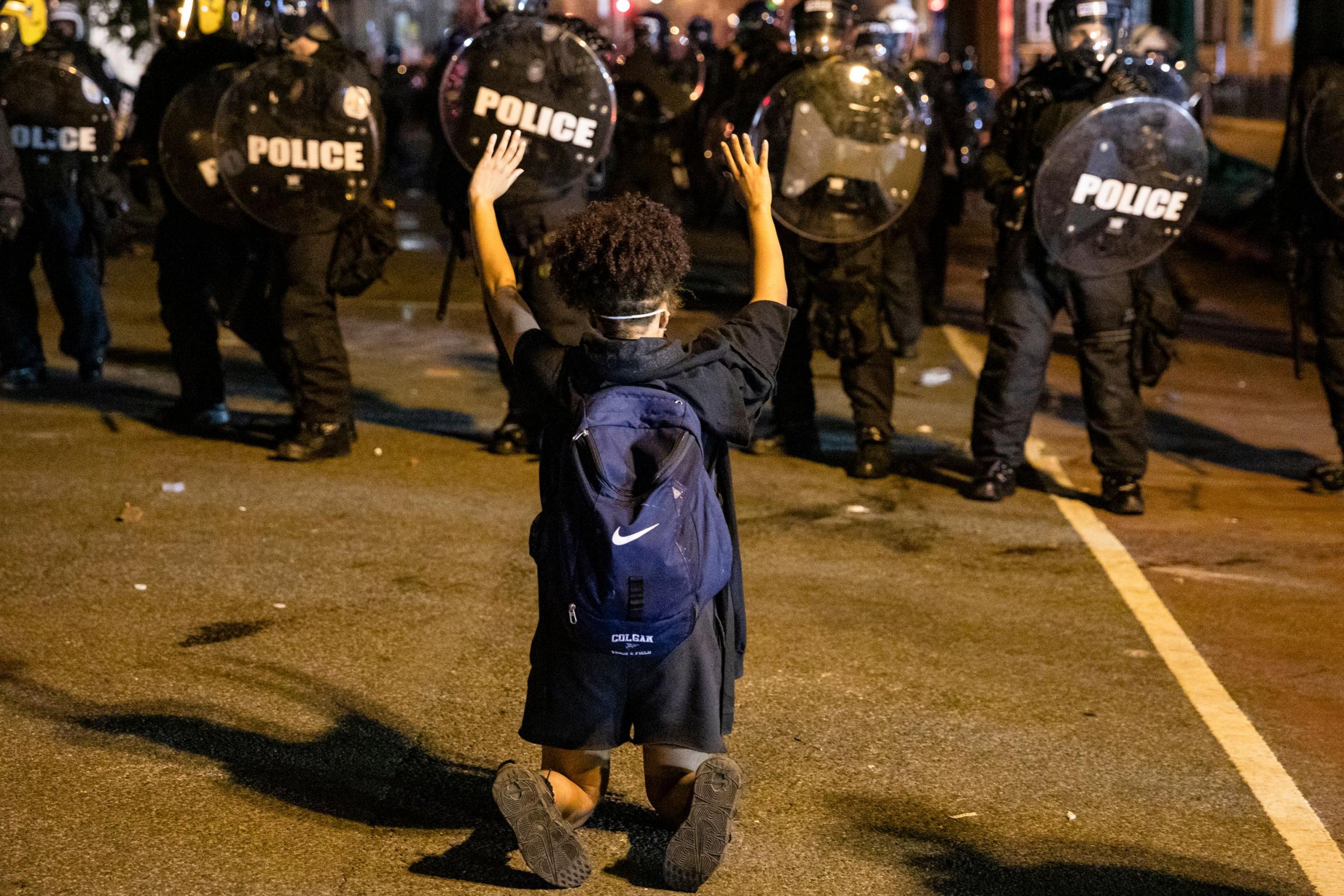Are we really built for prejudice and violence? The new book challenging the preconceptions of human behaviour
‘Humankind: A Hopeful History’ refuses to offer up easy answers on human nature, and its timing couldn’t have been better, writes Ceri Radford


Your support helps us to tell the story
From reproductive rights to climate change to Big Tech, The Independent is on the ground when the story is developing. Whether it's investigating the financials of Elon Musk's pro-Trump PAC or producing our latest documentary, 'The A Word', which shines a light on the American women fighting for reproductive rights, we know how important it is to parse out the facts from the messaging.
At such a critical moment in US history, we need reporters on the ground. Your donation allows us to keep sending journalists to speak to both sides of the story.
The Independent is trusted by Americans across the entire political spectrum. And unlike many other quality news outlets, we choose not to lock Americans out of our reporting and analysis with paywalls. We believe quality journalism should be available to everyone, paid for by those who can afford it.
Your support makes all the difference.Books are a long time in the making: seven years, to be precise, in the case of Dutch historian Rutger Bregman’s fascinating new doorstop, Humankind: A Hopeful History. It is unlikely that he precisely managed its publication to coincide with a pandemic and mass protests sparked by racist police brutality, but the timing is nonetheless striking. These two events go to the heart of the arguments he explores in his book: are people basically decent, predisposed to draw rainbows, shop for their neighbours and protect the vulnerable by somehow resisting the charms of Barnard Castle? Or are we built for prejudice and violence?
These are huge and highly sensitive questions, which the historian attacks with his usual brand of vim, vigour and intellectual nuance. Instead of dry academic prose, we get a sort of Dutch Sherlock Holmes, furiously prodding at the sacred cows of psychological research and laying out his counter-arguments with the breathless pace of a thriller. The main assumption that he sets out to debunk is “veneer theory”: the Hobbesian idea that civilisation is a thin layer that keeps our nasty, brutish instincts in check. Take away our laws and hot showers, and what do you get? Lord of the Flies.
Except Bregman tracked down a real-life example of ship-wrecked kids, and what transpired had little in common with William Golding’s gloriously grim novel. As he recounts, in 1965, six boys aged between 13 and 16 were so fed up with their boarding school in Tonga that they stole a fishing boat to escape to Fiji. They ended up marooned for over a year on a small rocky island. But instead of descending into chaos and bloodshed, “The boys had set up a small commune with a food garden, hollowed-out tree trunks to store rainwater, a gymnasium with curious weights, a badminton court, chicken pens and a permanent fire.” One boy fell and broke his leg but his friends managed to set it with sticks; there was a rota to share tasks and any arguments were solved by sending the opponents off to cool down at opposite ends of the island.
This is, of course, one incident rather than social science. But as Bregman argues, it says something about our negativity bias that Lord of the Flies rings out as hauntingly true, whereas this upbeat story is barely a footnote in our collective consciousness. And when it comes to actual research, Bregman also aims a well-placed kick at “one of the most notorious scientific studies ever”: the Stanford prison experiment of 1971, which asked students to play the roles of guards and prisoners. Infamously, a uniform and a smattering of power was all it took to turn wholesome undergraduates into tyrants, forcing their peers to strip and chaining them by the ankle.
In Bregman’s account, however, something quite different happened. Guards were explicitly instructed to behave badly, and did so believing that they had to ham up their roles for the research to work. Even so, “two-thirds of the guards refused to take part in the sadistic games”. Bregman isn’t the first to criticise the experiment – as he notes, French sociologist Thibault Le Texier wrote a book denouncing the findings, called l’Histoire d’une mensonge, or the Story of a Lie. In his turn, the psychologist behind the experiment, Philip Zimbardo, has defended it as a “cautionary tale”. Interestingly, Bregman notes a BBC documentary called The Experiment run by psychologists in 2002. It attempted to test the same principle, but with an ethics board, and without chivvying the guards to act like monsters. The result was “mind-numbingly dull”, as everyone got along rather well and agreed to go to the pub together afterwards.
Lord of the Flies and Stanford are not the only dark truisms that start to crumble. Bystander theory? CCTV footage from around the world shows most people don’t stand idly by but rush to help those who are in trouble. Soldiers as killing machines? From the American Civil War to the Second World War, research cited shows many combatants prefer to waste time loading their guns or shooting over the enemy’s heads. Challenging our blood-drenched pop culture, Bregman memorably writes: “The image cooked up by Hollywood has about as much to do with real violence as pornography has to do with real sex. In reality, says the science, violence isn’t contagious, it doesn’t last very long and it’s anything but easy.”
At first glance, this optimistic message jars not only with the systemic violence that sparked the George Floyd protests, but the worst atrocities of history – candidly, Bregman notes that he struggled to find a publisher in Germany. But Humankind turns more interesting and urgent as Bregman explores how “veneer theory”, which encourages us to assume the worst of people, can blight lives, stoke racism and warp our public institutions.
One particularly pertinent example is the “broken windows” approach to policing, which was largely credited for a dramatic decline in crime rates in New York. By cracking down on the smallest misdemeanours, the theory goes, you prevent a culture where larger crimes take root. But who did the police target? Bregman cites data showing that “a mere 10 per cent of people picked up for misdemeanours are white”, with many black teenagers stopped and frisked on a monthly basis, despite never having committed an offence. In Bregman’s view, “broken windows has poisoned relations between law enforcement and minorities, saddled untold poor with fines they can’t pay and also had fatal consequences”. He cites the example of Eric Garner, who was killed in a police chokehold in 2014 for allegedly selling loose cigarettes, and whose last words were also “I can’t breathe”. Despite the lives lost or broken, according to Bregman, a 2015 meta-analysis showed no evidence that aggressive “broken windows” policing did anything to reduce crime. He also writes convincingly about Norway’s humane and cost-effective prison system, versus the notoriously brutal and racist status quo in the United States.

Where does this all leave the kind in Humankind? Some of the most intriguing research Bregman mentions is from Yale’s Infant Cognition Centre, or “Baby Lab”. The good news? Infants as young as six months old have an innate sense of morality, gravitating towards puppets that behave in a helpful way. The bad? We’re born xenophobes, with babies preferring puppets that are mean but similar to them versus kind but different. Needless to say, these intrinsic tendencies can be magnified or bridged by the societies we choose to build.
There are no easy answers on the question of human nature, and now is not the right time to generalise: the author himself has talked about the sensitivity of the publication’s timing in media appearances. But books like this one ask important and unsettling questions about the assumptions that underpin our approach to everything from schools to prisons, from police to politics. “Veneer theory” could be doing people a disservice in deeper ways than we realise.
Join our commenting forum
Join thought-provoking conversations, follow other Independent readers and see their replies
Comments